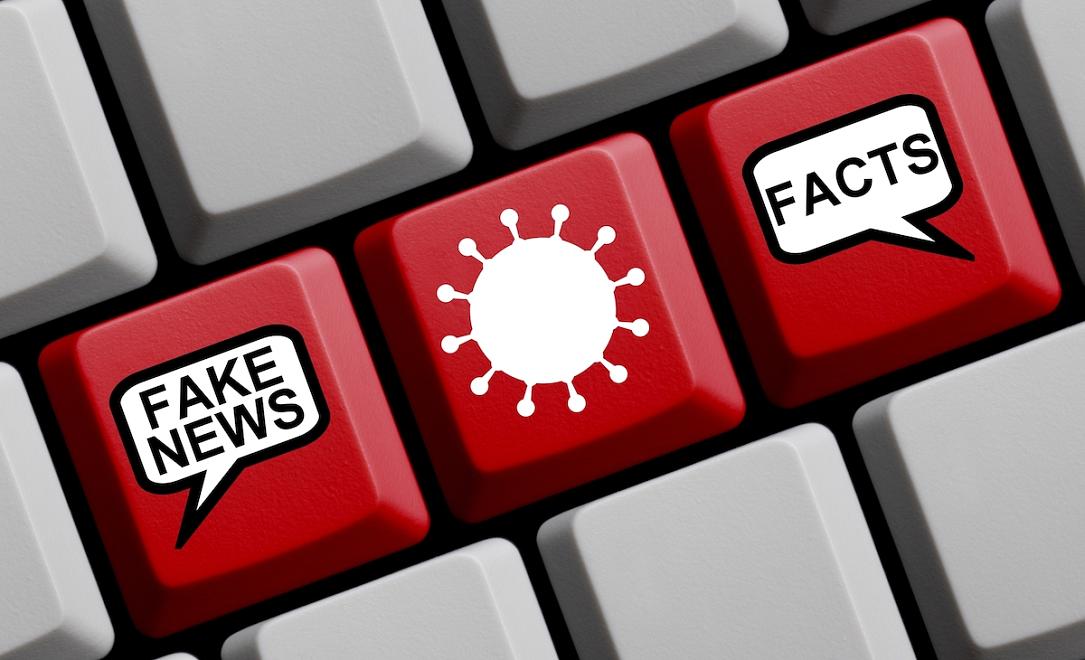Short guides from the Romanian authorities: How to spot fake news & common COVID-19 myths to ignore



Information on COVID-19 circulating in the public space may be incorrect or incomplete and can do more harm than good. Thus, it's essential to be appropriately and correctly informed, for various reasons: to prevent the spread of the virus and to help resolve the crisis faster, to reduce panic and anxiety, and to keep yourself and your family and friends safe.
The Romanian authorities have made a short guide on how to spot fake news. So, when reading a story, try to keep these questions in mind:
- Does the article have an alarming or sensational title or a title that is not justified by its content?
- Is the author anonymous or not mentioned?
- Is it published on a website whose owner is unknown/difficult to identify?
- Does the article not refer to primary sources of information, or are these sources hard to identify?
- Does the story not provide concrete or contextual information (for example, it does not answer the questions "When?" "How?" or "Why?")?
- Is the author speculating or just sharing his own opinion?
- Does the text include quotes that seem incomplete or out of context?
- Has the right to reply of the persons/institutions mentioned in the story not been respected?
The authorities say that checking more than half of the criteria listed above is a sign that the reader should question the content of the article and double-check the information in other sources as well.
To prevent the spread of fake news, the readers should use official sources to check the data, and not promote or share stories or any other information that doesn't seem trustworthy. Those who spot fake news should report it to the social media platform (if that's where they've seen it), to the National Authority for Management and Regulation in Communications - ANCOM (in case the story was published by an online news platform), or to the National Audiovisual Council – CNA (if the story was broadcast by a radio or TV station).
In Romania, the institutions/platforms that officially inform the population on COVID-19 are the Ministry of Interior, the Department for Emergency Situations, the Government, the National Institute of Public Health, the Ministry of Foreign Affairs, the Romanian Presidency, the General Inspectorate for Emergency Situations, and the Fiipregatit.ro, Stirioficiale.ro, and Cetrebuiesafac.ro platforms.
The full guide is available here (in Romanian).
Here is a list of several myths about the coronavirus, checked by the Romanian authorities and shared in a short guide aimed at helping people stay informed and safe in these strange times:
- Breathing hot air can cure the coronavirus. False. There is no scientific evidence to confirm that the inhalation of hot air kills the virus that has already invaded the upper respiratory system. Unusual practices, such as breathing in hot air from a hair drier, can cause accidents or injuries.
- Homeopathic treatment prevents COVID-19. False. Homeopathic remedies are not effective in preventing or treating COVID-19. You should only take medication at the doctor's recommendation.
- Drinking water every 15 minutes prevents coronavirus infection. False. There is no evidence to confirm that coronavirus infection could be prevented by regular water consumption. However, be sure to hydrate properly (2 liters of water per day).
- Sanitary alcohol can help prevent COVID-19. True. Sanitary alcohol (70% ethanol) is a disinfectant and can help prevent COVID-19. It is recommended for the disinfection of surfaces.
- Vitamin C helps prevent COVID-19. False. There is no evidence that Vitamin C helps prevent or treat the infection with the new coronavirus.
- Eating garlic can prevent infection with COVID-19. False. Garlic is a healthy food that may have some antimicrobial properties. However, there is no evidence that garlic consumption can protect you from the new coronavirus.
- Antibiotics are effective in preventing and treating COVID-19. False. Antibiotics do not work against viruses, only bacteria. The new coronavirus is a virus, and therefore antibiotics should not be used as a means of prevention or treatment. However, if you are hospitalized due to infection, you may receive antibiotics because bacterial co-infection is possible.
- Can spraying alcohol or chlorine all over your body kill the new coronavirus? No. Spraying alcohol or chlorine all over your body will not kill viruses that have already entered your body. Spraying these substances can be harmful to clothing or mucous membranes (eyes, mouth). Be aware that both alcohol and chlorine may help disinfect surfaces, but they must be used according to recommendations.
- Are hand dryers effective in killing the new coronavirus? No. Hand driers are not effective in killing COVID-19. To protect yourself from the new coronavirus, you should frequently wash your hands with soap and water or clean them with an alcohol-based hand rub. After washing your hands with soap and water, dry them with paper towels or a warm air dryer.
- Should crowded areas and playgrounds be avoided? Yes. Given the state of emergency declared amid the coronavirus pandemic, the movement of persons outside the home/household is prohibited, with certain exceptions. Avoid crowded areas where you are exposed to direct contact and/or interaction with a large number of people, such as public gatherings, queues, high traffic areas, and recreation areas. Recreational activities can be carried around the house/household, but are contraindicated.
- Warm weather prevents coronavirus infection. False. Existing data show that the infection with COVID-19 can happen in all climate zones, including in areas with hot and humid weather.
- Is the flu vaccine effective in the prevention of COVID-19? No. The influenza vaccine neither favors nor protects against COVID-19 because these are two different viruses.
The full guide is available here (in Romanian).
newsroom@romania-insider.com
(Photo source: ID 177815223 © Keport/Dreamstime.com)